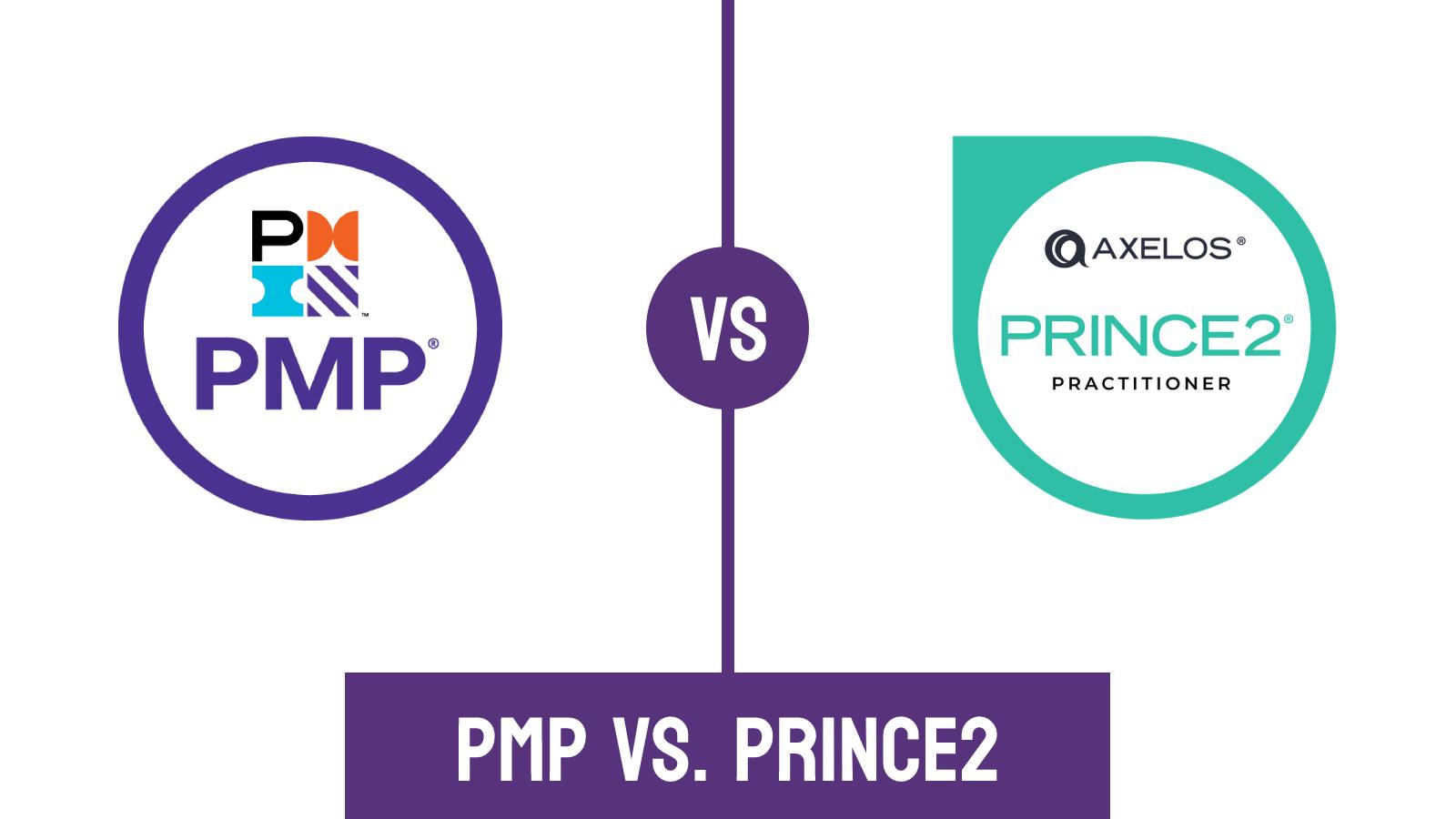PMP vs. PRINCE2: Which Certification Should You Get in 2024?
Let me make a few assumptions about you.
I assume that at this point you’re sure that project management is the right occupation for you.
Most probably, you already work as a PM and want to enhance your professional profile and gain new knowledge by getting a professional certification.
PMP is recognized worldwide, but PRINCE2 is also a well-known and respected project management certification.
In this article, we’ll talk about their similarities and differences, which one is harder to get, and which of them will be the most relevant for you.


Differences between PMP and PRINCE2 certifications
PRINCE2 certification in a nutshell
“PRojects IN Controlled Environments”, or PRINCE2, is a prescriptive project management methodology. It defines the processes and principles to be followed.
Developed at the request of the UK government, it was maintained by government entities until the transfer to Axelos in 2013. PRINCE2 is quite popular in the UK and Eastern Europe but it’s also adopted in Australia and other countries worldwide.
PRINCE2 certification exams have two levels. The entry-level exam, Foundation, validates the applicant’s knowledge of the PRINCE2 concepts. The Practitioner exam checks the interpretation of the concepts in real-life scenarios.
Going forward, I’ll be comparing PMP to PRINCE2 Practitoner. An equivalent of PRINCE2 Foundation is CAPM by PMI.
Related: How to prepare for PRINCE2 certification exams.
PMP certification in a nutshell
Project Management Professional or PMP certification is an effort to promote the best practices of the day, and it evolves over time.
The PMP exam tests the knowledge of the processes and methodologies, but the goal is to determine if you’re in tune with the current best practices in project management.
The 2015 version was deeply rooted in the traditional methodology, testing the candidates’ knowledge of the five stages of the project: initiating, planning, executing, monitoring & controlling, and closing.
The version rolled out at the beginning of 2021 covers three broad domains:
- People. Soft skills, like team building and communication.
- Process. Technical aspects, like defining the scope and calculating risks.
- Business development. Organizational strategy, long-term planning.
PMP is popular in the US, and it’s the most widely recognized PM certification globally.

What is more Agile: PMP or PRINCE2?
The current iteration of PMP has a strong Agile spirit. Not because of the emphasis on the specifics of Agile practices like XP or Scrum. It’s more about the project manager’s role as a leader who empowers. To answer the questions, you need to be in an Agile mindset.
PRINCE2 is firmly a traditional project management method. PRINCE2 Agile is interfacing the PRINCE2 method with Agile approaches like Scrum and Kanban, and techniques like applying the Cynefin framework.
Related: What is the Cynefin framework for decision-making?
If you want to dig deeper into Agile practices, consider certifications by Scrum.org, like Professional Scrum Product Owner. Here’s a guide to preparing for all levels of the PSPO exam.
PMI vs. Axelos: PM certification providers
Project Management Institute (PMI) was formed in 1969 and became a leading project management certification provider worldwide.
Their most famous certification is Project Manager Professional, but the credential portfolio spans 20+ certifications in traditional and Agile project management, business analysis, and organizational transformation.
PRINCE2 certification was maintained by the Government of the United Kingdom until its transfer to Axelos, a joint venture set up by the UK government and public company. But the exams themselves are provided by a certification institute called PeopleCert.
Their most recognized certifications are PRINCE2 and ITIL (IT service management). Axelos provides 10+ certifications in project, program, and portfolio management.
Prerequisites for PMP and PRINCE2 Practitioner
When you choose between PMP and PRINCE2, the biggest question you need to ask yourself is:
Do I have 36 months of confirmable experience leading projects?
That’s the prerequisite for PMP. That is, if you have a four-year university degree – with a high school diploma or Associates Degree, you’ll need 60 months of non-overlapping project management experience.
The requirements for PMP used to be much steeper. The experience measured in hours, and you had to present at least 4500 hours, noting how much you spent exactly on each of the five stages of project management.
PRINCE2 doesn’t have work experience prerequisites.
The entry-level one, PRINCE2 Foundation, doesn’t have any requirements at all.
PRINCE2 Practitioner requires either PRINCE2 Foundation certification or one of the credentials from the list Axelos provides. The list includes CAPM and PMP by PMI.
Related: How to successfully pass the CAPM exam.
PMP vs. PRINCE2 exam cost
The cost of the PRINCE2 certification exam depends on the country you’re from. PeopleCert locates your country and shows the prices based on it, noting which country the price is for. You could also select the country from the dropdown on the page.
PRINCE2 Practitioner exam prices start at around $500. For the UK, the price is 515 GBP (~620 USD). For the United States, the PRINCE2 Practitioner exam cost is 655 USD.
The PMP exam fee is $555 for non-members and $405 for PMI members. I noticed that the PMP exam price may vary based on your country, but there’s no official notification about this on the PMI pages.
The price for the exams themselves is comparable, with PRINCE2 being on the more expensive side.
But for PRINCE2 Practitioner, you also need the PRINCE2 Foundation or another entry-level certification, which adds to the total cost. PMP could be taken directly.
Is PMP harder than or easier than PRINCE2 Practitioner?
I won’t be comparing the number of questions, the duration, and other small details of the exams themselves – you could read more about them in my guides on preparing for PRINCE2 and getting ready for the PMP exam.
Both PRINCE2 Practitioner and PMP are challenging exams, but PRINCE2 could be considered easier because of the following:
- The pass mark is lower
- A sample exam paper with a full set of questions is provided
- There’s an official manual that fully covers the scope of the exam
- The current exam version has been around for longer, so there are
Let’s talk about those factors in more detail.
Related: Strategies and tips to prepare for a certification exam.
PMP and PRINCE2 passing score
The passing score for the PRINCE2 exams is 55%.
For PMP, the passing score isn’t officially revealed, but it’s estimated to be around 70%.
PMP vs. PRINCE2: do they give the sample exam questions?
PMI provides only a few official sample questions for PMP.
Axelos provides a full set of sample exam questions with detailed explanations for each of its exams.
You could also purchase the exam simulators for both PRINCE2 and PMP. In my article on exam preparation, I give tips on how to make the most out of the exam simulators.
How often do PMP and PRINCE2 exams change? What are their topics now?
PMP certification provider, Project Management Institute, is closely following the project management industry trends and updates its exam every 3-5 years to reflect them.
PRINCE2 as a method remained largely unchanged for a while. The preparation manual, Managing successful projects with PRINCE2, had a major revision in 2009 (it’s known as the 5th edition), and then another one in 2017 (the 6th edition). The method remained the same, but the latest version made it easier to understand and had a more comprehensive explanation of how it’s tailored to different kinds of projects.
Related: How to prepare for the PMP exam.
What is the failure rate for PMP and PRINCE2 exams?
Nobody really knows this but the exam providers, PMI and PeopleCert, respectively. To get the rates, you need access to extensive statistics. If anyone draws the numbers without citing the source, you would be right to question their methods and their agenda.
What I could say is, based on the experiences people share, passing PMP used to be notoriously hard.
For one, people had to perform various calculations based on various memorized formulas. Now, you need to understand the relationships between the values used in the formulas and assess the situation that involves them.
But even if the failure rates for both exams were less than a few percent, preparation for both PMP and PRINCE2 Practitioner should be taken seriously. Never underestimate the opponent.
PRINCE2 vs. PMP renewal requirements and costs
Both PMP and PRINCE2 Practitioner have to be renewed every three years. Since 2023, PRINCE2 Foundation needs to be renewed as well.
Each certification has a continuing education program. You earn a certain number of Professional Development Units (PDU) for PMP or Continuing Professional Development (CPD) units for PRINCE2 Practitioner and submit a renewal fee to extend your certification for another three years.
The PMP renewal fee is $150 for non-members and $60 for members of PMI.
PRINCE2 requires Axelos annual membership at 50 GBP/year to submit CPD every year, so the de-facto renewal fee in three years is £150.
What is the salary of PMP and PRINCE2 certification holders?
Vary depending on the country and the industry. Since PRINCE2 is especially popular in the United Kingdom, comparing the average PRINCE2 holder salary would be like comparing the average experienced UK project management salary to the earnings of all the other PMs in the world.
So, I won’t try to give the exact numbers. However, it’s safe to say that on average, people who have PMP or PRINCE2 Practitioner earn more than people who don’t.
So, there’s a correlation between having a credential and a higher salary. However, the causes may vary:
- Credential is the cause. People who have high-level certifications like PMP or PRINCE2 Practitioner are more likely to land a good job or get a promotion.
- Credential is the effect. People who are growing as professionals are solidifying their status by obtaining certifications.
- Third factors at play. People who are curious and like challenges are more likely to succeed in their career and more interested in passing professional certification exams.
Summary. Should I get PMP or PRINCE2?
You can’t go wrong with PMP. If you have 36 months of confirmable experience working in leading roles on projects, then definitely go for it.
If you’re from the UK, a variation of PRINCE2 will likely be more relevant. But you might opt to get it if you want a more advanced PM certification but don’t yet have the work experience for PMP.
At the end of the day, this doesn’t have to be a question of either/or. It’s important to keep learning and growing as a professional, and obtaining certifications is one of the ways of doing that. PMP and PRINCE2 certifications are different enough that, if you have one, you might want to get the other one as a challenge.
Also, if you enjoy challenges, look into the third level of Professional Scrum Master certification.